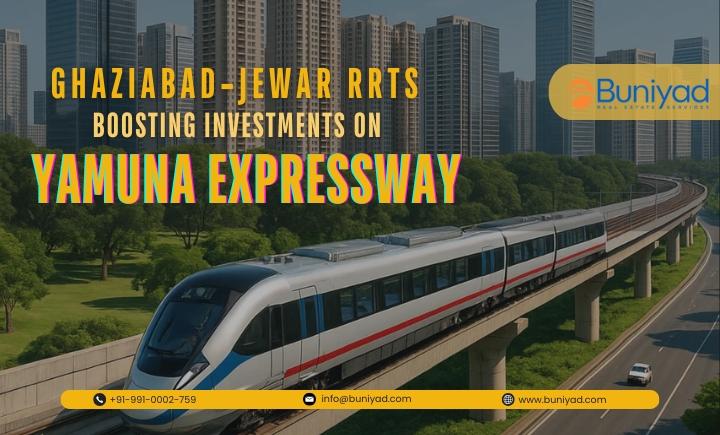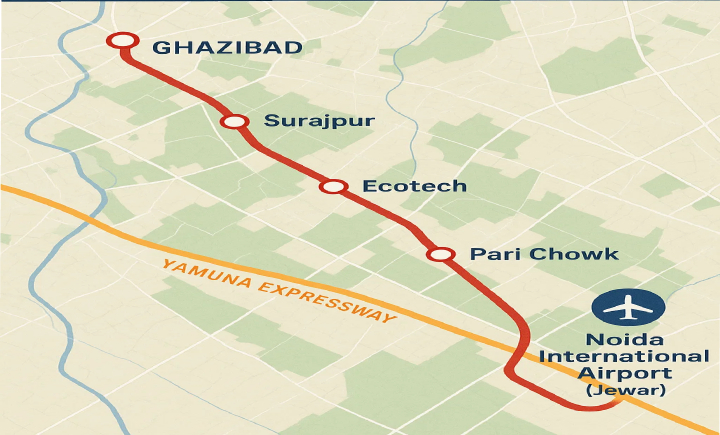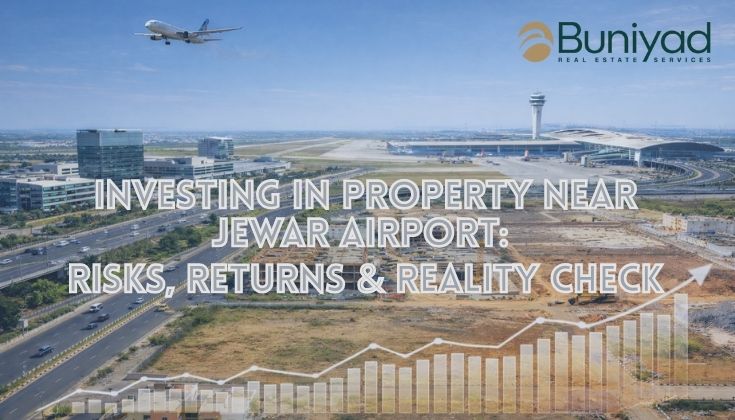
Register here and Avail the Best Offers!!
 +91-999 9111 100
+91-999 9111 100

 By Buniyad
By Buniyad 06/27/2025
In a list of offerings to take Noida to greater heights, the city’s infrastructural growth has remained steady over the last few years. The Yamuna Expressway corridor has long been eyed for its strategic positioning and future potential. Once operational, the Noida International Airport at Jewar, touted as Asia’s largest airport, will make international travel for the state’s people a breeze. Now, the Ghaziabad-Jewar RRTS (Regional Rapid Transit System), expected to partially launch by 2027, is adding a powerful new dimension to this landscape.
This 72-km corridor between Jewar (Noida International Airport) and Ghaziabad is being designed to cater to the growing challenge of population growth, traffic congestion, and pollution. It will significantly reduce travel times and offer seamless connectivity across key zones of NCR. The idea behind this high-speed corridor is to offer travel solutions at a dual level: supersonic connectivity to the airport and major commercial zones, as well as easy metro access to everyday commuters in Ghaziabad, Greater Noida, and YEIDA regions.
With the rail link promising to provide faster access to key areas, the demand for Greater Noida and Yamuna Expressway properties is set to surge. Read on to learn what this corridor—being managed by the National Capital Region Transport Corporation (NCRTC)—entails and its impact on real estate growth.
A part of the over 82 km rapid rail corridor named the Delhi-Meerut Regional Rapid Transit System (Delhi-Meerut RRTS), the Ghaziabad-Jewar RRTS will prove to be a boon for intercity travel. This semi-high-speed rail corridor is aimed at directly connecting Ghaziabad with the Noida International Airport at Jewar via Greater Noida (W), Surajpur, and Ecotech Pari Chowk. The route has been designed such that it will become a critical spine of connectivity across eastern NCR.

The corridor will be developed in two phases. While Phase 1 will target the stretch between Ghaziabad and Greater Noida and is expected to be operational by 2027, Phase 2 will extend the route to Jewar Airport, with full completion projected around 2030. With two depots on both ends of the corridor, it will have a total of 12 stations.
The RRTS is different from conventional metro systems in the sense that it offers higher-speed travel, helping cover long distances in reduced time. For instance, the journey from Ghaziabad to Jewar Airport is expected to take less than 50 minutes, compared to over 2 hours by road today. The distance from the airport to Delhi Aerocity will now be covered in around 66 minutes, transforming airport commutes across NCR.
Further, the corridor promises excellent integration with existing transport networks. It is expected to intersect with the Aqua Line of the Noida Metro, as well as with railway stations and interstate bus terminals, etc., enabling smooth transitions across the regional transit system. All stations will be laced with CCTVs, security staff, and platform screen doors (PSDs) for added commuter safety. Numerous eco-friendly measures have been planned to ensure sustainability.
This multimodal integrated corridor will help decongest the national capital and promote safe, sustainable, high-speed suburban transportation alternatives for commuters by significantly reducing dependence on private vehicles.
The UP State Government is expected to bear 50% of the total project cost, estimated at Rs. 20,045 crore; the central government and YEIDA, along with the Greater Noida Authority, will take care of the remaining amount by contributing 20% and 30%, respectively.
The upcoming airport has already resulted in a high demand for real estate along the Yamuna E-way. With the Ghaziabad-Jewar RRTS aiming for swift connectivity, land prices are set to go further north.
Yamuna Expressway properties have doubled in the past few years in valuation, and industry experts forecast an additional 30–50% rise by 2027, especially in sectors close to the proposed RRTS stations, followed by sectors where RRTS alignment will pass through. Gaur Yamuna City, a major township near the airport site, has reported strong plot sales and steady buyer interest.
Developers have acted swiftly on this response by clients. Multiple residential and commercial projects have been launched or planned in areas like Sector 18, Sector 20, and Techzone IV. Not only homebuyers but also retail and office space seekers are betting on the airport economy, adding to a high demand.
With transit commuters adding to the footfalls, the scope of malls, high-street retail, hotels, and co-working spaces will go up. As a result, real estate investors have shown a high inclination towards mixed-use plots and commercial hubs near future stations.
The RRTS will not function in isolation—it will work hand-in-glove with the existing infrastructure. The area already boasts multiple expressways (Yamuna, Noida-Greater Noida, and Eastern Peripheral), as well as elevated roads connecting to Delhi and Ghaziabad. These networks will act as last-mile enablers for RRTS users.
The corridor’s route touches areas close to Greater Noida’s IT and industrial belts, the proposed Film City, and key data center hubs. With a strong web of transportation facilities, the workforce will be able to enjoy improved mobility, potentially reducing commute stress and increasing productivity.
With a mix of soon-to-be operational and upcoming infrastructure developments like international airports, industrial zones, and tech parks converging around high-speed rail, the entire belt between Ghaziabad and Jewar is set to enjoy the status of becoming NCR’s next real estate frontier. Similarly, as the Ghaziabad-Jewar RRTS moves closer to reality, Yamuna Expressway properties are witnessing renewed interest by end users and investors alike.
If you too wish to benefit from this gradual shift towards the Greater Noida property scenario, get in touch with us at Buniyad Realty today!
Also Read: Top Reasons to Invest in Yamuna Expressway Property: Jewar stealing the limelight

Presented as usual on 1st February, 2026, […]

Once known only as a satellite township […]

Real estate centered around airports has always […]

Greater Noida has today grown into one […]

Touted as a major step in the […]

Once a satellite city to Delhi, Noida […]

Noida – once just a satellite town […]

Noida has today grown into one of […]
Buniyad Blog is proudly powered by WordPress
Head Office
G-57/58 , Buniyad Chowk, Sector-18, Noida Uttar Pradesh
+91-999-9111-110Greater Noida
S.L. TOWER 1ST FLOOR, ALFA COMMERCIAL BELT, Noida Uttar Pradesh
+91-020-42040004South Delhi
A-32, First Floor, Feroz Gandhi Rd, Lajpat Nagar-II,New Delhi.
+91-11-41006000Gurugram
JMD REGENT SQUARE GF-11 M.G. ROAD,Gurugram 122001
+91-124-4313200